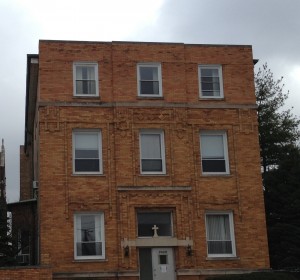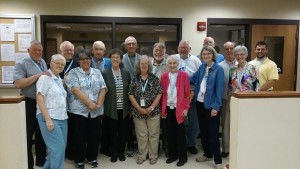In times of uncertainly and confusion, a person desires nothing more than the calming kindness of a stranger or a neighbor, who generously offers assistance, support, and understanding. This is the ministry of hospitality. I experience this ministry every Friday when I spend my day at ICDI’s House of Hospitality, where I help the men living there with school assignments and learning English. The house, located in Cicero, IL, is for men who have been released from detention and have no other place to go upon their release. Upon hearing this process for the first time, I was awestruck by the unpredictability of it all. Dropped off on the corner of 101 West Congress, these men, uncertain of their surroundings but certainly confused on what to do next, are approached by a stranger who knows their name and nothing else. The stranger ask them to get in the car so they can take them to this mysterious house that their legal counsel has told them about. The men agree and the ministry of hospitality begins. Once they arrive, the new residents are given basic necessities: a small room to live in, clothes, hygiene products, and a small stipend for public transportation. Most, however, send a portion of this stipend to their families back home. I was more inspired by the hospitality extended to these men; yet, the residents also illustrate the ministry of hospitality in a miraculous manner.
The house is by far the most diverse place I have ever been. Fifteen men live in the home and more than 10 countries, spanning from China to Ethiopia and many places in between, are represented. All the men are bilingual and many are trilingual, yet levels of English vary the spectrum from minimal to superb. Communication, however, is not stifled by the barriers of language or culture because each man in the house extends hospitality to one another. It is as if the ministry of hospitality becomes a universal language they everyone is able to speak. All of them are separated from their families. All of them are living in an unfamiliar place. All of them are painstakingly waiting for some sort of status or permit to come from the immigration system. Many have been waiting for more than a year and a half, and the waiting will continue. The men deeply comprehend each other’s situation because they too are living the same reality. It is the shared experiences of restlessness in their waiting and anxiety about their futures that allow for the ministry of hospitality to be exercised freely. I will provide one example.
Headed to the house for the third Friday in a row, July 17th was a steaming hot day with spectacular sunshine that Chicago had not seen all summer. As I walked in, a delicious scent of spices and smoke coming from the kitchen filled the house. I followed the smell to find a feast being prepared by Ray, who is from Rwanda and no stranger to the kitchen. I have seen Ray preparing something or cooking a meal each of the previous Fridays. Each time he offers me something to eat or drink as soon as I arrive. I asked Ray what this feast was for. With sweat gleaming from his brow he told me that today was the beginning of Eid, which is the celebration that occurs at the end of Ramadan, a month of fasting and prayer for Muslims. Ray said the Muslims in the house were downtown praying and they would be hungry when they returned. So I asked Ray how I could help and the only thing he wanted me to do was test the food. The food was almost complete when the Muslims came back drenched in sweat and in obvious need of water and food. To their surprise, Ray had prepared a feast fit for the whole house so that all could join in their celebration. The table was set, the food cooked, and hospitality was served.
The most endearing aspect of this story was knowing that Ray is a Christian. Most Christians I neither know what Eid is, nor have they ever sat down for a meal with a Muslim. Yet, Ray understood the significance of the day, he understood his fellow residents of the house would be hungry, and he understood they needed food. And so he cooked for them. The Muslims did not ask Ray to prepare a feast full of chicken, beef, rice, salad, and soup. Instead, Ray used the ministry of hospitality to invite his neighbors to the table and join in a celebratory feast of both Eid and brotherhood. As ten men, some Christian and some Muslim, from numerous countries sat around the table, I was able to witness and experience the ministry of hospitality in a way that most people never will.

Opened two years ago, the Marie Joseph House of Hospitality for Men is home to 15 men representing more than 12 countries.
Interning with the Interfaith Committee for Detained Immigrants is unlike any internship I could imagine. Most internships focus on the completion of a project or report that will be of some use for the organization and display the impressive new skills or information the intern has gathered. However, this is not the emphasis of my internship. My role at ICDI is to experience this ministry of hospitality and solidarity. I will not leave with a specific task done or a tangible goal achieved. I will leave, however, with stories, relationships, and experiences: stories of remarkable encounters such as this one, relationships with the unlikeliest of people, and experiences that will shape my thinking from now and forevermore.


